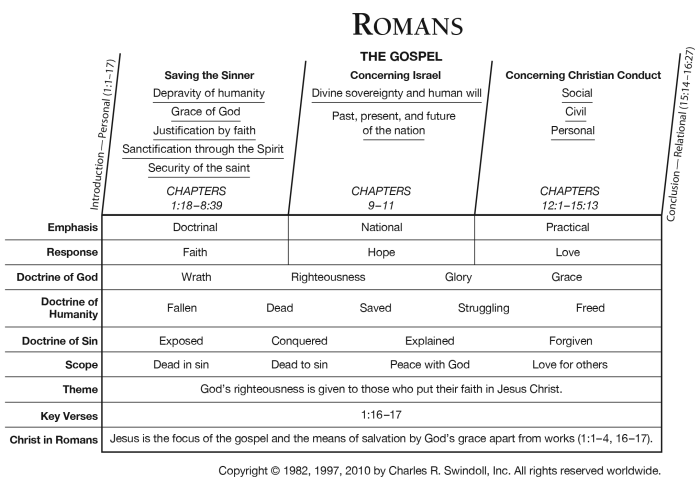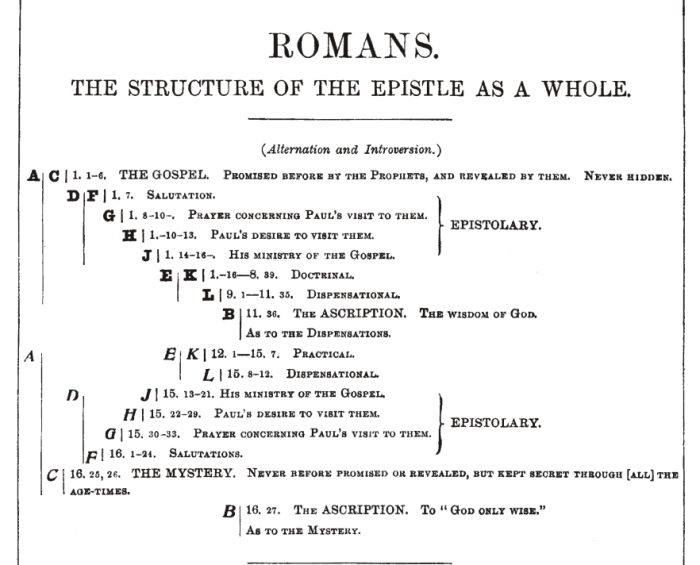Summary of the book of romans chapter by chapter – Embark on an in-depth exploration of the Book of Romans with this comprehensive chapter-by-chapter summary. Delving into the heart of Paul’s profound teachings, we will uncover the multifaceted truths that have shaped Christian theology and continue to inspire believers today.
From the foundational concepts of God’s righteousness and humanity’s sinfulness to the transformative power of justification by faith, each chapter offers a wealth of insights into the nature of our relationship with God and the path to salvation.
Introduction to the Book of Romans

The Book of Romans is a profound and influential letter written by the Apostle Paul to the church in Rome. It serves as a comprehensive treatise on the Christian faith, outlining its central doctrines and practical implications. Romans is considered one of the most significant books in the New Testament, providing a systematic and comprehensive exposition of the gospel.
Paul’s purpose in writing Romans was to lay a theological foundation for the church in Rome and to address the tensions between Jewish and Gentile believers. Through his writing, Paul aimed to unify the church, clarify the relationship between faith and works, and articulate the essential elements of Christian living.
Chapter 1: The Righteousness of God Revealed

In Chapter 1, Paul establishes the foundational principles of the gospel. He begins by declaring that the wrath of God is revealed against all ungodliness and unrighteousness (1:18). He then argues that all humanity has sinned and fallen short of God’s glory (1:23). As a result, people are under condemnation and subject to God’s judgment.
However, Paul also proclaims the good news that God has provided a way of salvation through the righteousness of Jesus Christ (1:16-17). This righteousness is received by faith and is available to all who believe (1:17).
Chapter 2: All Have Sinned and Fall Short

In Chapter 2, Paul expands on the universal nature of sin. He argues that both Jews and Gentiles are guilty before God and that no one can boast of being righteous (2:1-11). Paul emphasizes that God will judge people according to their deeds, whether they are good or evil (2:12-16).
However, Paul also notes that God is merciful and offers forgiveness to those who repent of their sins and believe in Jesus Christ (2:4). He stresses the importance of seeking God’s righteousness and living in accordance with his will (2:17-29).
Chapter 3: Justification by Faith: Summary Of The Book Of Romans Chapter By Chapter

In Chapter 3, Paul presents the central message of Romans: that justification is by faith alone, apart from the works of the law (3:21-28). He argues that all people are justified by God’s grace through faith in Jesus Christ (3:24). Paul emphasizes that this justification is not based on our own merits but on the righteousness of Christ, which is imputed to us when we believe (3:21-22).
Paul also addresses the relationship between faith and works in Chapter 3. He argues that while works are not necessary for salvation, they are the natural fruit of a genuine faith (3:28-31).
Commonly Asked Questions
What is the central message of the Book of Romans?
The central message of the Book of Romans is that salvation is a gift from God, received through faith in Jesus Christ, and not through human effort or merit.
How does Paul define righteousness in Romans?
In Romans, Paul defines righteousness as a gift from God, imputed to those who believe in Jesus Christ. It is not something that can be earned or achieved through human effort.
What is the significance of Chapter 8 in Romans?
Chapter 8 of Romans is a pivotal chapter in the book, as it focuses on the role of the Holy Spirit in the life of a believer. Paul emphasizes the transformative power of the Spirit, who indwells believers and empowers them to live a life pleasing to God.
